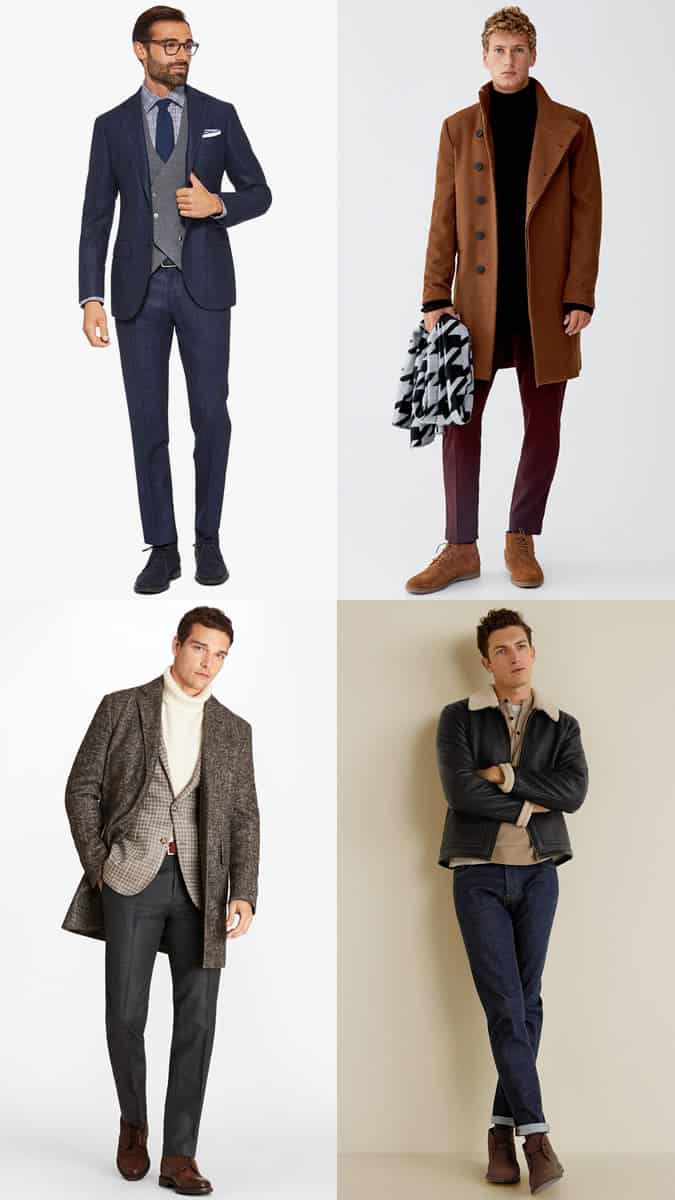Cold feet are a fact of winter, as reliable as dark mornings and drunken Decembers. The shoes you wear the rest of the year round – perforated trainers that let the chill in and low-rise shoes that let the rain in – don’t cut it in the worst of the weather. You need some winter boots and not just one pair, preferably two or three.
This is footwear originally designed for timber yards, hiking trails and the trenches of war; so you can be confident it will get you through a slightly frosty commute. In style, too, because the best winter boots are as good looking as they are practical.
Fashion has a thing for technical clothing of all kinds right now (hiking style and workwear are trends that won’t quit), but it’s always been happy to appropriate boots – from soldiers, mountaineers, riders and blue-collar workers. Those boots have the attributes all boots should have: durability, practicality, comfort and weatherproofing.
And despite those chunky soles and unforgiving leathers, winter boots are some of the most versatile shoes you can buy. Invest in the right pair and they’ll last decades if you look after them as much as they do you. So, best foot forward. Find the style that suits you best below, along with the go-to ways of wearing them.
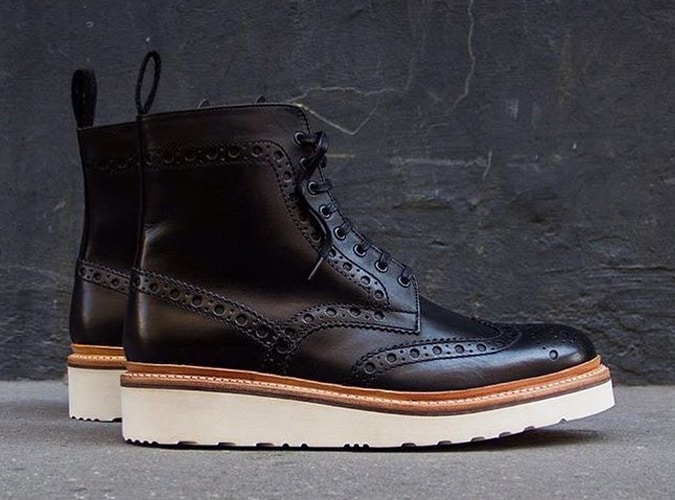 Grenson
Grenson
What To Look For In Winter Boots
Quality Materials
Good winter boots shouldn’t be dirt cheap if you want them to last, and you should. “The quickest way to spot quality in a boot is by the quality of the upper material,” says Tim Little, creative director and CEO of Grenson.
“A well-made boot will always be made of quality leather because no one would go to the effort of making a great boot in cheap leather. Quality leather always has soft creases and usually is hand polished so you can see the patina and dark and light patches. It isn’t always uniform.”
Alternatively, look for tanned leather, which tends to be thicker than painted leather and shouldn’t need as much weatherproofing.
Goodyear-Welted Soles
A solid footing in the winter means a pair of boots that feature the famous Goodyear welting technique to stitch the sole firmly to the upper via a rib-like strip of leather or canvas.
“The stitching of the welt can be seen above the welt and the sole stitch (through the welt) underneath the sole,” says James Fox, brand director for Crockett & Jones. “Be careful though. If you cannot see the continuation of this stitch through the sole you could be looking at a pair of cheaper, cemented boots using an imitation welt.”
Intel
“A well-made boots brand has detailed information about how they make boots, where they are made and what materials they use,” says Rik Van Dijk from Red Wing. “A good boot maker is proud of this information.”
“And if you are looking for a winter boot with the perfect fit and quality? Go to the store of the boot maker or a speciality store. There you get all the information and fit you need to get the perfect boots for your feet.”
Practicality
Recognising that most of us only wear our boots to either the office or the pub, shoemakers have, in recent years, fitted their designs with comfortable and practical soles. Combat-style treads will make you even more sure-footed while contrast white rubber soles offer some smart-casual hybrid styling.
Likewise, shoemakers (even the likes of Dr Martens) have made efforts to offer lighter versions of their chunkiest and most iconic styles with new materials offering the same wear and practicality.
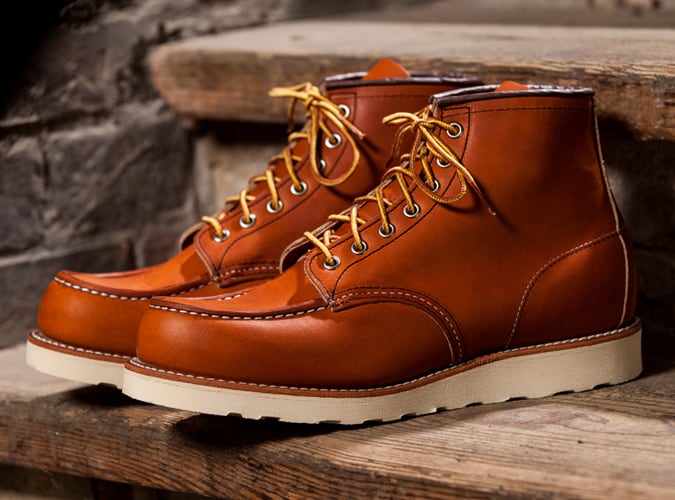 Red Wing
Red Wing
The Best Winter Boots Styles
Hiking Boots
Have you been spending your weekends training for a forthcoming trip up Kilimanjaro? If the answer’s no, then you can be forgiven for overlooking the humble hiking boot as a viable footwear option. But only just.
Regardless of your outdoorsy aspirations (or lack thereof), hardy hiking boots have established themselves as foul-weather footwear essentials over the past few years – especially among sharp men who prize a shoe’s ability to face down all manner of meteorological nasties in style.
We’re not experts in adventure sports, so we’ll leave recommending boots for seriously tough terrain to the professionals. What we can do, though, is suggest designs that are ideal for navigating city streets, heavy dog walking sessions and the occasional trip to a countryside pub.
You need a pair that offers untold levels of comfort, ankle support and other orthopaedic box-ticking features such as full-leather linings and cushioned footbeds. (Although you could sack that off and get a beautiful but hardly practical suede pair from a high-fashion designer that hasn’t seen a mountain in their lives.)
Team them with other tough-as-old-boots menswear staples like raw denim, corduroy, twill or flannel shirts and cable knit jumpers. You could also pair them with rainstoppers and fleece to lean fully into the outdoors trend. Or be bold and use them as a striking counterpoint to tailoring – just not for your next job interview.
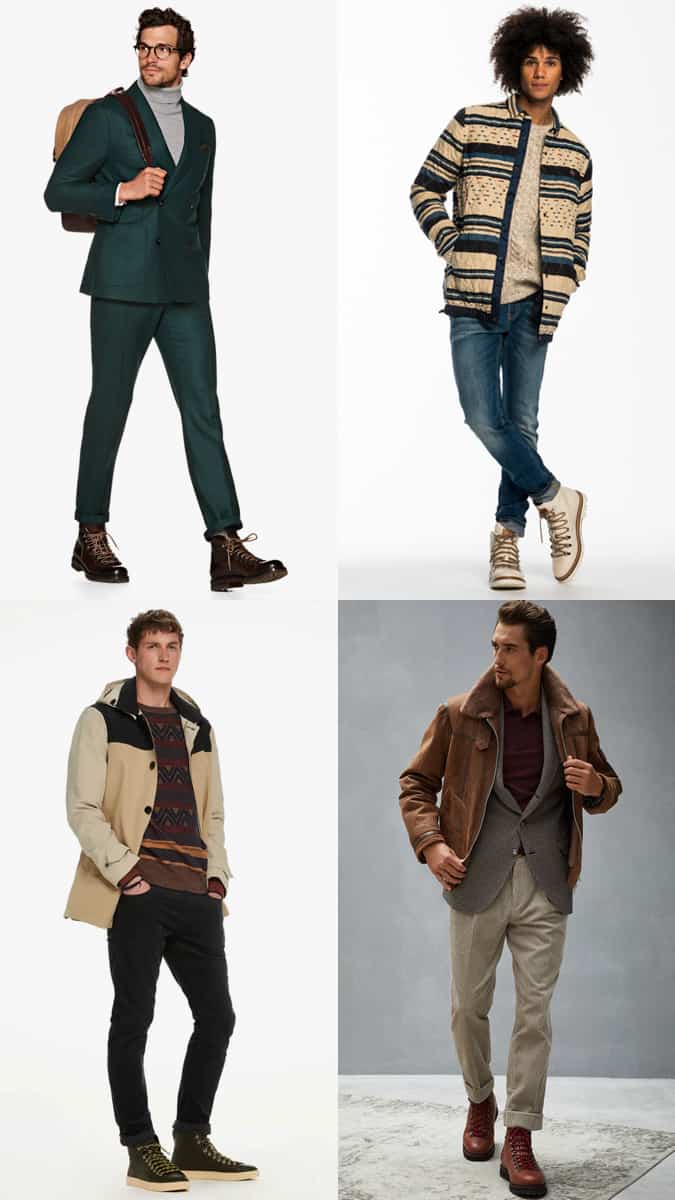

Brogue Boots
If you’re not ready to go full Bear Grylls with a pair of hiking boots, there are other, subtler ways to infuse your winter look with some outdoorsy influences. A sartorial hybrid, the brogue boot comes with the same reassuring weight and solid construction of hiking boots, but with all the wing-tipped, country-manor smartness of brogues.
As a general rule of thumb, you can wear your brogue boots with any outfit you might normally wear with traditional brogues, so lace up a dark brown or black leather pair with heavier wool suiting, and smart trouser and shirt/cardigan combinations.
However, owing to their winter-readiness, brogue boots also play well with pieces that straddle the rugged-refined divide, such as heavy-gauge knitwear, gilets, waxed and quilted jackets, as well as heritage fabrics such as corduroy and tweed.
While sock-flashing isn’t necessarily frowned upon when wearing a pair of these, it’s not an entirely natural fit with the brogue boot’s finesse either. Stick instead with trousers with a neat break (i.e. that finish around the top set of lace eyelets), or roll more casual trousers and jeans up to the same point for a smart finish.
Look out for rubberised soles for some extra winter practicality.
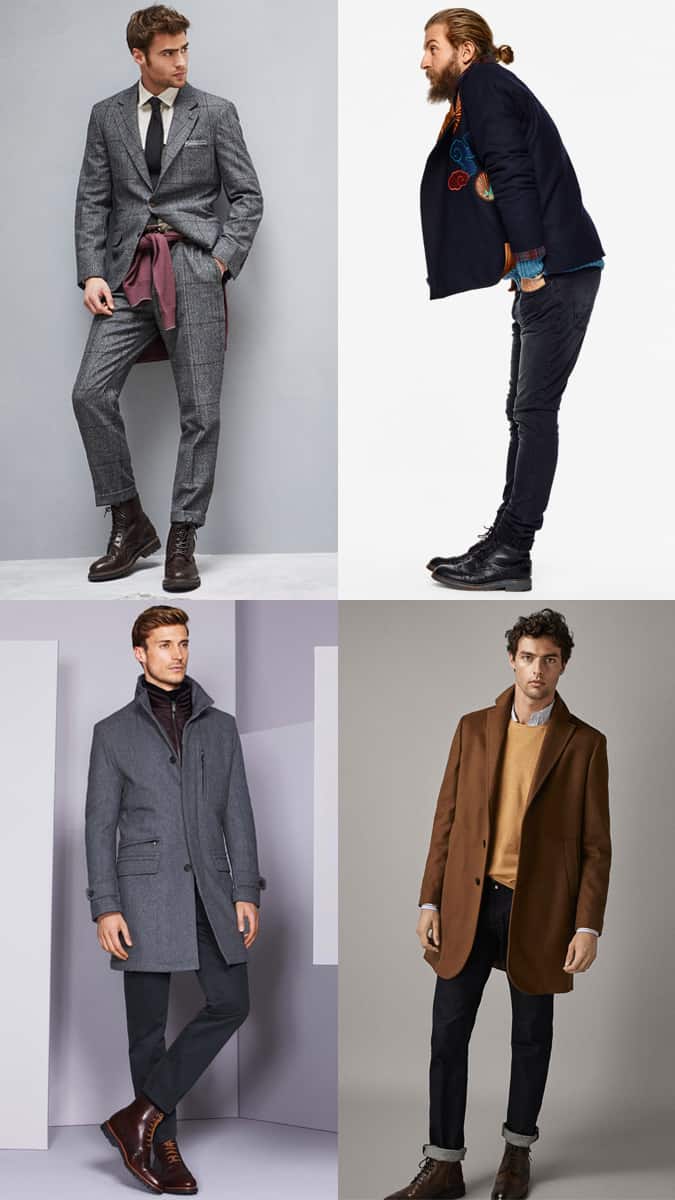

Work Boots
Some of the best boots ever made were first designed decades ago for people to wear in factories and shipping yards. The steel toe caps may not have survived the fashion crossover, but many other features have: waterproof materials, padded ankles, high-grip soles and cosy linings. Why wouldn’t you want those things for your feet when it’s freezing outside?
The most iconic work boots – the Timberland Yellow Boot, Red Wing’s classic moc toe – have remained almost unchanged for decades, which makes it surprising that they’ve been adopted by such diverse style tribes. Hip-hop artists, lumbersexuals and workwear enthusiasts all love a work boot.
That means you can pair them with a range of casual (always casual) outfits, from joggers to jeans, trucker jackets to parkas. Look for dyed leather or waterproof nubuck and sealed seams to keep the puddles at bay.
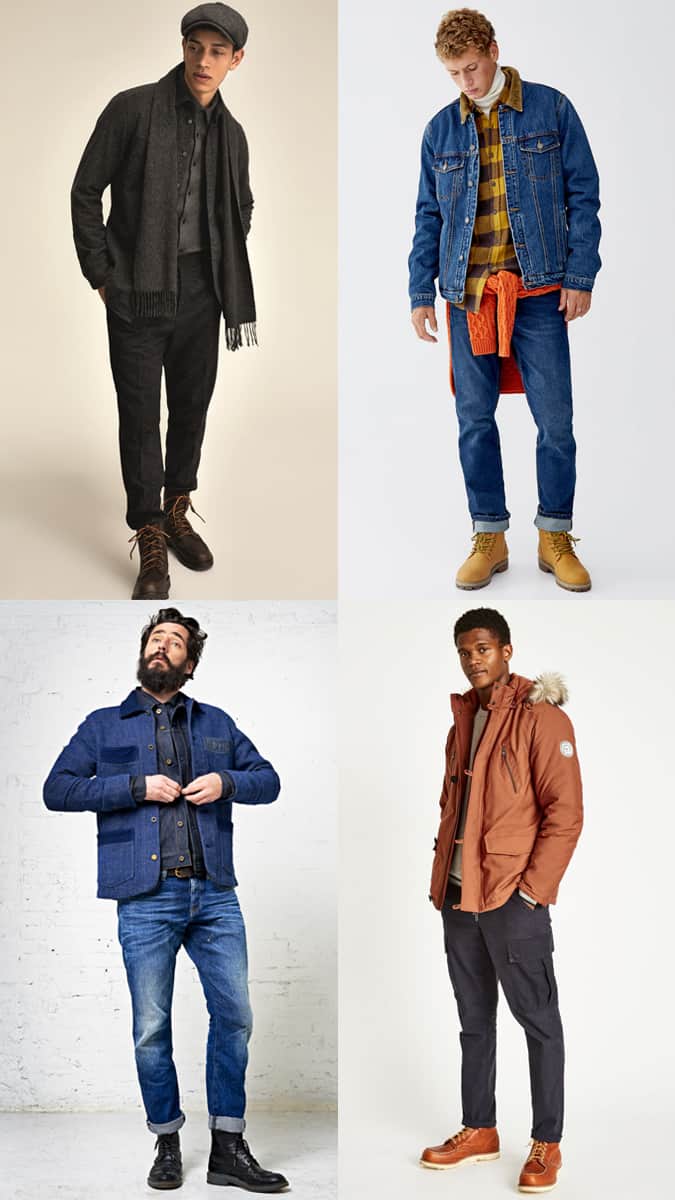

Combat-Style Boots
Like most items in a man’s wardrobe, boots have a proud history of military service. From high lace-ups designed to keep out trench foot to modern tactical designs, combat boots have recorded a number of victories on the fashion front.
Right now, they’ve not just won the battles, they’ve won the warcore. The directional trend for combat trousers, holsters and all things military means there’s rarely been a better time to buy this style. Not that you have to leave the house looking like a character from Call of Duty.
Look at Ryan Gosling’s character in Blade Runner 2049. He paired tactical boots you can buy on Amazon with a statement overcoat. Or designer Charlie Caseley-Hayford who wears his trademark high boots with classic tailoring. Streetwear fans might pair them with jeans and a bomber. Or an easy middle-ground is heritage wear: wool, twill cotton, generous fits and plenty of herringbone.
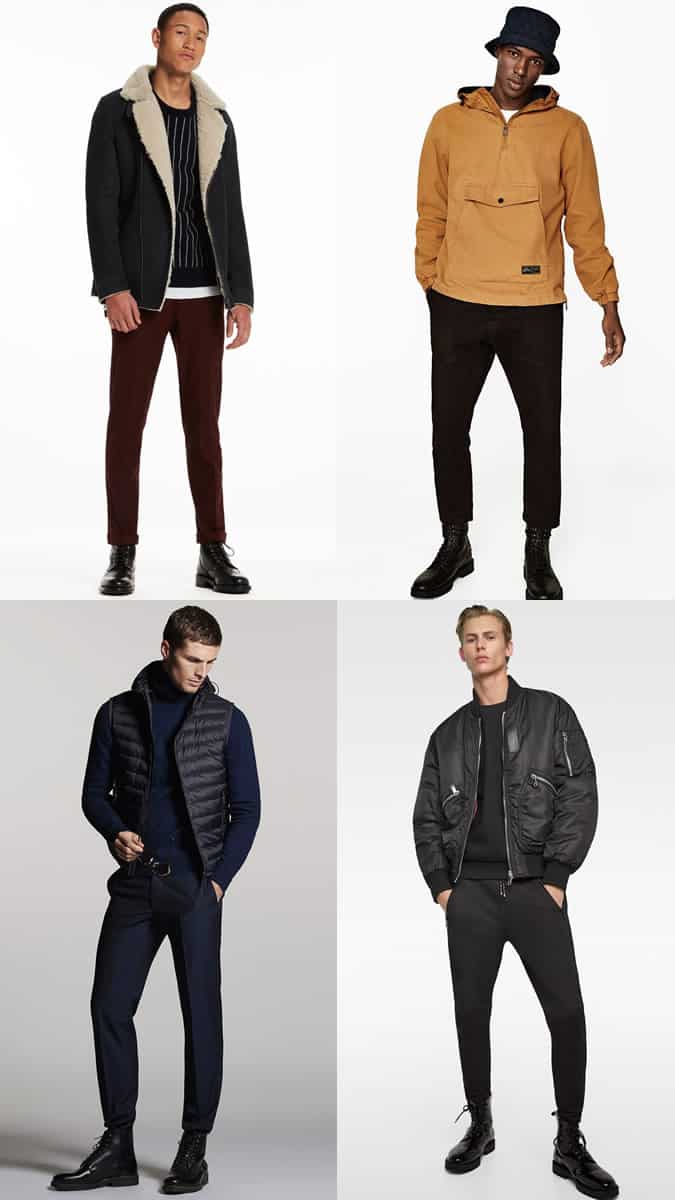

Chelsea Boots
The Swiss Army Knife of your shoe rack, the Chelsea is by far the most versatile boot you can buy; the right pair looks just as good worn with a suit or tailored trousers Monday to Friday as it does a leather jacket and shredded skinny jeans for a gig at the weekend.
While suede Chelsea boots have something undeniably louche about them, it’s a delicate material that is hard to keep pristine in or just after a downpour. If you can’t be bothered with regular cleaning, brushing and applications of protector spray all winter, opt for easy-wipe leather instead. As it happens, a pair in smooth black leather is much closer to the iconic original anyway.
Details to look out for include autumn-ready rubber soles and the classic heel pull, a practical feature that many modern iterations don’t have (but should). Also, mind your toes. Pointed-toe Chelsea boots, when worn with a suit at least, look a little off, so keep your sights firmly set on round-toed styles instead.


Ankle Boots
As far as we’re concerned, there are few instances in which wearing a pair of desert or chukka boots isn’t a good idea. While their mid-weight construction marks them out as a clear choice for spring and summer, they’re actually a killer option for the winter months, too, along with other ankle tickling styles like jodhpur boots and low-rise hikers.
This in-between profile makes most ankle boots smart enough to style with a roll neck, blazer and smart wool trousers, but also not so fussy that they can’t be coupled with chinos and a crew neck sweatshirt. Perfect for navigating the winter months’ dress codes quandaries.
Leather pairs are a no-brainer for the cold and wet, offering resilience and an enduring elegance, while suede pairs can also work if you take the time to regularly treat them with a protector spray and always check the forecast before you leave the house.
Treat this style – chukka or desert boots especially – as a smarter, more hard-wearing alternative to trainers. Team them with chinos, button-down shirts and crew neck jumpers to create sharp, warm getups that will pass the pub-safe test no problem.
